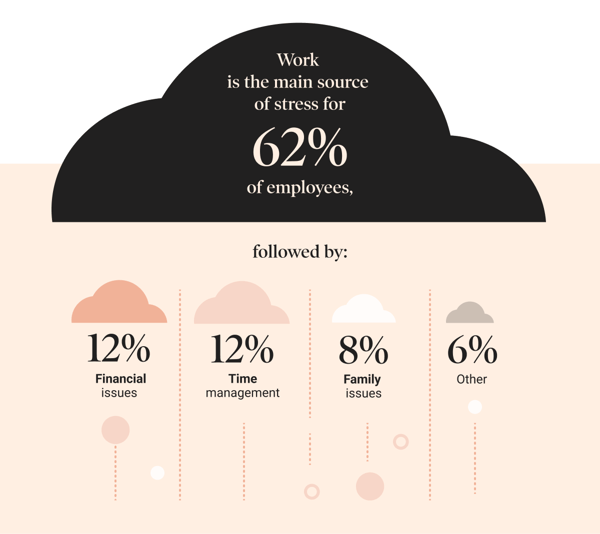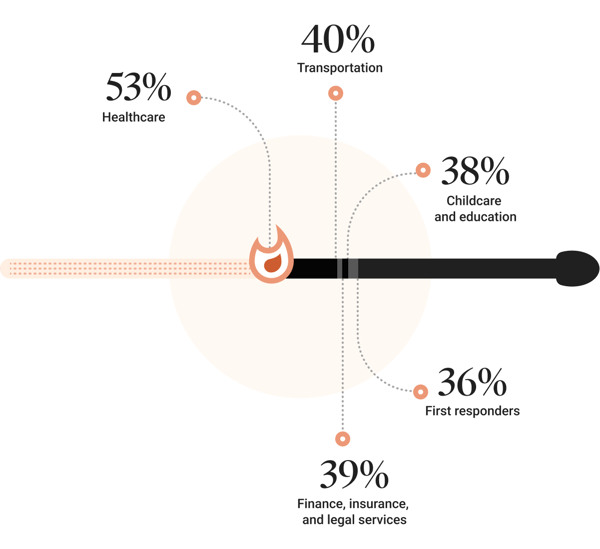Studies show that most Canadians – a whopping 84% – have experienced some form of burnout. This shouldn’t come as a surprise. With lingering concerns about the pandemic, global crises, and personal challenges, almost half of employees report mental health concerns.

In fact, over a third of respondents describe their levels of workplace stress as high or extreme. Rates of stress are well above the national average in some industries. For example, 66% of nurses feel burned out.

Organizations and employees across the country are facing the consequences of chronic burnout
|
Risks for organizations: |
Risks for employees: |
|
|
With Canadians increasingly in tune with their mental and physical health, it’s more important than ever to approach workplace well-being issues with empathy. Empathy is the ability to understand and validate the feelings of others. By acknowledging that stress and burnout are more common than we think, we can initiate more compassionate conversations, provide better resources, and change the way we approach wellness at work. Here is everything you need to know about beating burnout with empathy.
Why does empathy matter?
Despite improved understanding around mental health, many people are still ashamed to speak up about their issues: over 50% of Canadians experiencing mental health problems are worried about discrimination. Having an empathy-first approach to managing and preventing burnout means facing it without judgment.
Empathy towards others: Reaching out to colleagues and employees with empathy allows for people to be themselves and talk about what they’re going through. It lets them know that they’re heard and supported.
Empathy towards oneself: When we’re unable to deliver our best work, support others, or perform at our usual level, we may judge ourselves harshly. Self-compassion in times of stress is crucial for managing challenging situations and beginning recovery.
Empathetic environments: Workplaces that acknowledge burnout make it easier for individuals to seek help. A supportive environment removes the onus of managing stress from the person experiencing it. In other words, the effort needed to heal and recover doesn’t solely fall on the person affected, but also on their network. Organizations that recognize stress and burnout might provide better resources, like quick access to mental health specialists.
Being empathetic helps create an environment that optimizes people’s well-being.
Recognize the signs of burnout
When it comes to mental health, being empathetic can make it easier to recognize signs of distress not only in others, but in ourselves as well.
With burnout, there are often noticeable changes in the way the person feels, acts, and relates to their surrounding. Here are common indicators of stress and burnout to look out for.
Behavioural changes:
|
Cognitive changes:
|
Physical changes:
|
Psychological changes:
|
Focus on tolerance
Being patient with others
Tolerance might come easy when interacting with colleagues who face physical barriers. You would patiently hold the elevator door for someone in a wheelchair, or help a colleague with a broken arm by carrying their things, right? However, mental barriers, like burnout, are often invisible. This means tolerance might not come as easily, and you might find yourself feeling annoyed if a usually high-performing colleague seems less focused. To create an empathetic environment at work, practicing tolerance is crucial.
Being patient with oneself
Beyond extending patience to others, it’s vital to be patient with yourself. Make an effort to acknowledge feelings of stress and burnout. Accept that you might not be as alert, motivated, or energized as usual. Recovering from mental health challenges can be slow in progress, so give yourself permission to “be human”.
Tune in and listen well
It can be hard to understand why someone is feeling overwhelmed by a seemingly normal situation. In this case, your instinct might be to share your perspective or opinion in an effort to alleviate their stress. But to support a colleague or loved-one with a mental health issue, we first need to listen. Here are simple ways to be an active and supportive listener:
|
Remember that everyone has a different level of tolerance to different stressors. |
|
|
Before weighing in with a well-intentioned opinion, take time to understand their perspective. |
|
|
To help the person feel validated, ask thoughtful questions that help you understand their experience. |
|
|
Try not to interrupt and respect moments of silence, even if it feels awkward. |
|
|
Sharing personal stories can help you be vulnerable and relate to the other person, but don’t rely on your own experiences to offer solutions. |
Be an active problem-solver
Provide practical support
You may not be in a position to offer treatment for burnout, but there are other ways to alleviate daily stress:
-
Volunteer to help them with small tasks.
-
Help them organize their workspace or do household chores. Everyday tasks are sometimes neglected when going through stressful situations.
-
If you’re getting lunch, ask if you can get them something to eat. With burnout, other well-being elements, like healthy eating, are often overlooked.
-
Take time to recap meetings they might have missed, so they still feel involved and engaged.
Encourage professional help
Seeking help as early as possible has a big impact on how quickly the person can heal from burnout. However, asking for help can feel scary and embarrassing. Help them prepare for treatment by:
-
Reminding them that burnout is a mental health condition, not an indicator of personal weakness or failure.
-
Coming prepared with contact information for mental health providers.
-
Helping them make an appointment and fill out any forms.
Recognize warning signs
If they don’t feel ready to seek professional help, that’s ok. You can still support them by staying alert and watching for signs of worsening mental health:
-
They are increasingly detached or withdrawing from social situations.
-
They have emotional highs and lows within short periods of time.
-
They feel hopeless and trapped in a situation.
-
They start consuming drugs or alcohol more heavily.
-
They contemplate or talk about death.*
*If you notice a suicide risk, contact emergency services immediately: 911 (on cellphone *4141) or refer the person to a crisis prevention service: 1-833-456-4566.
Conversation takeaways
Approach the conversation with empathy. Your tone and how you phrase your concern has a direct impact on how your colleague responds. Make sure they understand that you are coming from a place of compassion.
X: Ugh! You were late for the meeting again!
✔: I noticed you were late today. Is everything ok?
✔: I’ve been concerned about you these last few days.
Remember to be patient. Your colleague might feel embarrassed or not ready to open up. In this case, offer your help, but respect their boundaries.
X: You should tell me what’s going on. I can help.
✔: Would you like to talk about it? I’m here for you if you need anything.
✔: When did you start feeling this way?
Come equipped with resources. If you decide to reach out to a colleague in need, make sure you are able to refer them to someone who can help. However, they might refuse help and be unwilling to acknowledge the severity of their symptoms. This is normal. Keep your resources on hand for when they are ready.
X: Everyone feels this way sometimes. You’ll get over it.
✔: Have you thought about getting help? I can help you make an appointment.
✔: It can be hard going through this alone. Our organization offers mental health support. Have you thought about making an appointment with a specialist?
Practice self-compassion
Self-care and self-compassion mean different things to different people. For some, it might mean taking time off from work, booking a massage, or going for a walk. But an important element of self-care is acknowledging mental health issues and actively working on stress management.
Keep track of your stressors
To beat stress, we need to understand what’s causing it. Every time your stress level increases, write it down. What situation are you in? How did you react? Take notes about your environment, the circumstances, and the people you’re with. This will help you identify stressful patterns in your daily life, so you can begin addressing them.
Set boundaries and stick to them
Being kind to yourself means respecting your limits. Everyone’s level of tolerance to stress is different: some people might feel overwhelmed by tight deadlines, while others thrive. Notice when it’s time to minimize your workload, cut back on overtime, or create distance with certain people.
Speak to your manager
Talking about stress is hard for everyone. But once you figure out what is causing your stress, it might be time to reach out to someone who can help. Here are three questions to answer before starting a conversation with your employer:
-
Which aspects of your job are making you feel anxious or stressed?
-
What impact is this stress having on your overall health, well-being, and productivity?
-
How could you start alleviating your stress?
Remember, the responsibility to heal from stress isn’t solely on you, but coming up with ideas to spark a meaningful conversation can help outline achievable solutions.
Speak to a specialist
Even if you feel like your stress and anxiety are under control, talking to a professional can equip you with the tools you need to improve your overall mental health and prevent the onset of burnout. It can also help you discover coping techniques to better manage daily stress.
Leading with empathy
Whether you’re a manager, a colleague, a friend, or a family member, an empathy-first approach to mental health is essential. This is why, at Dialogue, we’re driven by our mission to improve people’s well-being by providing the best quality care.
Our mental health program is designed with patient care in mind, offering treatment solutions for every unique need. Whether you opt for self-led therapy or prefer speaking with a Dialogue practitioner, you can access the support you need, when you need it.
Resources
-
New research shows more than a third of all Canadians reporting burnout
-
Stigma and Discrimination Around Mental Health and Substance Use Problems




 Canada (EN)
Canada (EN)
 Global (EN)
Global (EN)








